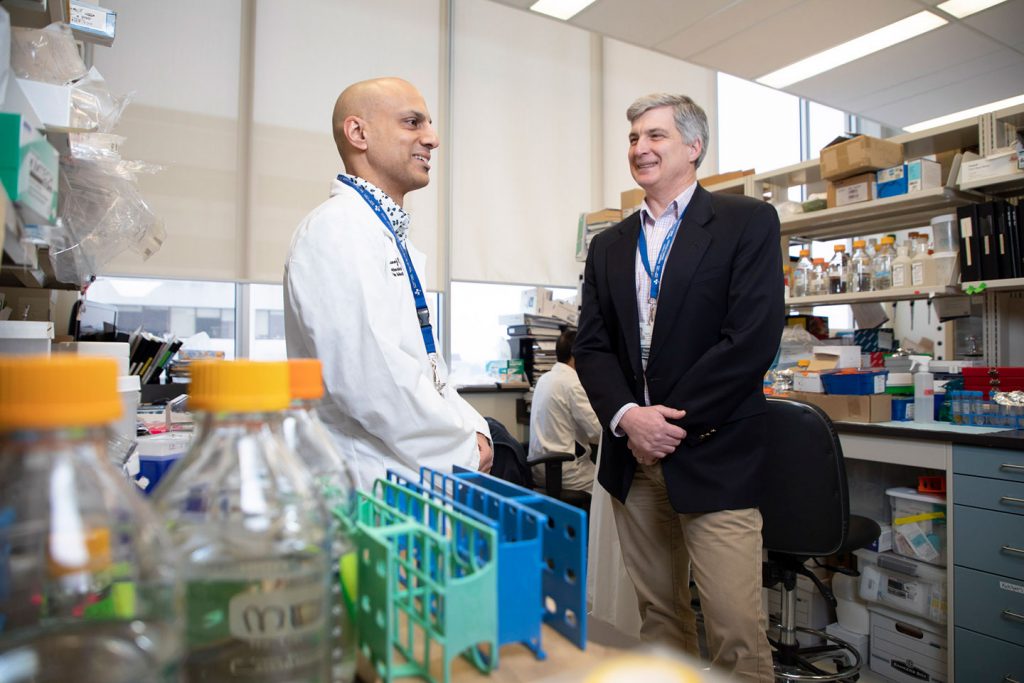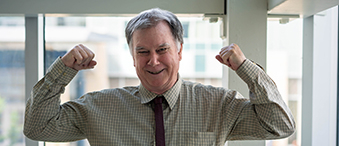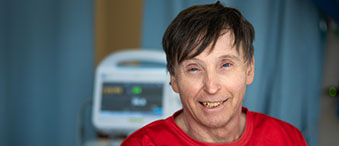The Ottawa Hospital, in partnership with BC Cancer, is launching a clinical trial using the first made-in-Canada CAR T-cell therapy.
Designing clinical trials is something The Ottawa Hospital does very well. At the moment, 825 clinical trials are underway — 200 of which are cancer trials.
For patients in the region this can mean better access to some of the most cutting-edge treatments available. For the hospital, it means better patient care, and an environment that attracts some of brightest research minds in the world to come here to collaborate, to develop better treatments, and to get closer to answering some of health care’s biggest questions.
World-class research expertise
“A lot of the clinical trial expertise is here,” said Dr. Manoj Lalu, associate scientist, and anesthesiologist at The Ottawa Hospital. “It’s well recognized that Ottawa is a world leader in clinical trials and innovative trial designs. A lot of the guidelines produced internationally around trial design and reporting originate from The Ottawa Hospital.”
The Ottawa Hospital has put all this expertise to work in designing and launching a made-in-Canada approach for CAR T-cell clinical trials.

Ensuring Clinical Trial Success
Drs. Manoj Lalu and Dean Fergusson worked in partnership with Dr. Natasha Kekre and others to make sure that the newly launched CAR T-cell clinical trial at The Ottawa Hospital is successful.
They have created a rigorous program, assessing current information about the therapy, looking at data and chart reviews from different health science centres, investigating the costs, and reviewing production. The team also interviewed patients to better understand what the barriers might be for them to enter a clinical trial.
“We’ve found that researchers dramatically overestimate the potential number of patients there are and the factors affecting them,” said Dr. Fergusson, Director of The Ottawa Hospital’s Clinical Epidemiology Program, and President of the international Society for Clinical Trials. “They all assume patients want to be part of a new therapy. But we’ve shown that is not the case.”
Involving patients in the process
Dr. Fergusson said there are many things that affect recruitment of patients to a clinical trial such as the distance they must travel to participate, or their family or caregiver situation. So, when Drs. Fergusson and Lalu were designing the trial, they assembled a team of people who were involved in both the creation and delivery of the therapy, such as the scientists and clinicians, while also including the patients, who would ultimately receive the therapy, as members of the team.
“Patient input has been essential to designing the clinical trial from the very beginning,” said Dr. Fergusson. “A patient panel helped create the information and consent forms that help patients understand the trial. So, when the actual patient who would be eligible for the trial reads this, there have been others, not just researchers, who have looked at this.”
“Patient input has been essential to designing the clinical trial from the very beginning.”
– Dr. Dean Fergusson
Ottawa broadcaster ‘Stuntman’ Stu Schwartz, who was treated for leukemia at The Ottawa Hospital, is one of the patient partners involved. Stefany Dupont is the only patient involved who has received CAR T-cell therapy. Patient partners such as Stu and Stefany, not only helped determine the outcomes researchers will be looking at in the CAR T-cell therapy trial, but also gave valuable feedback on the design of the trial. They offered a patient’s perspective on how the information was worded and on some of the processes that will help patients understand the study.
“They tell us if they understand, or if this doesn’t make sense, or ask, ‘Can you clarify this?’,” said Dr. Lalu. “It’s other patients, with the experience of having had a blood cancer, that really informs the whole process for the patients who will be enrolled.”
Building from the ground up
As with most trials designed at The Ottawa Hospital, patient care is embedded in it, with its design mimicking practice in the clinic and standard referral patterns. What makes The Ottawa Hospital exceptional is the way clinical trials are built from the ground up; including the right people at the right time, and most of all giving patients the opportunity to weigh in on everything from communication and recruitment to delivery options.
Drs. Fergusson and Lalu are also applying these concepts of building clinical trials to other health-care challenges, including post-surgical heart problems, stroke, and neonatal lung disease.
Organizations such as BioCanRx, the Canada Foundation for Innovation, and the Government of Ontario have supported The Ottawa Hospital’s CAR-T research and the Biotherapeutics Manufacturing Centre, but additional funding is essential to make this program a reality.
The Ottawa Hospital is a leading academic health, research, and learning hospital proudly affiliated with the University of Ottawa.




